Amanar Rasulu Bima Unzila Ilayhi Arabic Text, Transliteration, And Meaning
Surah al-Baqarah is the second and longest chapter of the Quran, containing 286 verses. The last two verses of this Surah, known as Amanar rasul, are considered to be one of the most significant verses in the Quran. Muslims believe that reciting these verses brings immense blessings and protection from evil.
Advertisements
Amanar Rasulu is often recited before going to sleep. In this blog, we will explore the meaning and benefits of Amana Rasulu in detail.
We will discuss the meaning of each word and phrase in these verses and examine the profound message they convey. We will also explore the benefits of reciting Amana Rasulu, both in this life and the hereafter.
Amana Rasulu Bima Unzila Ilayhi Meaning in English
The interpretation meaning of Amana Rasulu is The Messenger [Muhammad (Peace be upon him)] believes in what has been sent down to him from his Lord, and [so do] the believers. Each one believes in Allah, His Angels, His Books, and His Messengers. They say: “We make no distinction between one another of His Messengers” – and they say: “We hear, and we obey. [We seek] Your Forgiveness, our Lord, and to You is the return [of all].
286. Allah does not charge a soul except [with that within] its capacity. It will have [the consequence of] what [good] it has gained, and it will bear [the consequence of] what [evil] it has earned. “Our Lord, do not impose blame upon us if we have forgotten or erred. Our Lord, and lay not upon us a burden like that which You laid upon those before us. Our Lord, and burden us not with that which we have no ability to bear. And pardon us; and forgive us; and have mercy upon us. You are our protector, so give us victory over the disbelieving people.
Advertisements
Arabic Text of Amanar Rasul
Here is the full Arabic text of Amana Rasulu verses:
- آمَنَ الرَّسُولُ بِمَا أُنْزِلَ إِلَيْهِ مِنْ رَبِّهِ وَالْمُؤْمِنُونَ ۚ كُلٌّ آمَنَ بِاللَّهِ وَمَلَائِكَتِهِ وَكُتُبِهِ وَرُسُلِهِ لَا نُفَرِّقُ بَيْنَ أَحَدٍ مِنْ رُسُلِهِ ۚ وَقَالُوا سَمِعْنَا وَأَطَعْنَا ۖ غُفْرَانَكَ رَبَّنَا وَإِلَيْكَ الْمَصِيرُ.
- لَا يُكَلِّفُ اللَّهُ نَفْسًا إِلَّا وُسْعَهَا ۚ لَهَا مَا كَسَبَتْ وَعَلَيْهَا مَا اكْتَسَبَتْ ۗ رَبَّنَا لَا تُؤَاخِذْنَا إِنْ نَسِينَا أَوْ أَخْطَأْنَا ۚ رَبَّنَا وَلَا تَحْمِلْ عَلَيْنَا إِصْرًا كَمَا حَمَلْتَهُ عَلَى الَّذِينَ مِنْ قَبْلِنَا ۚ رَبَّنَا وَلَا تُحَمِّلْنَا مَا لَا طَاقَةَ لَنَا بِهِ ۖ وَاعْفُ عَنَّا وَاغْفِرْ لَنَا وَارْحَمْنَا ۚ أَنْتَ مَوْلَانَا فَانْصُرْنَا عَلَى الْقَوْمِ الْكَافِرِينَ
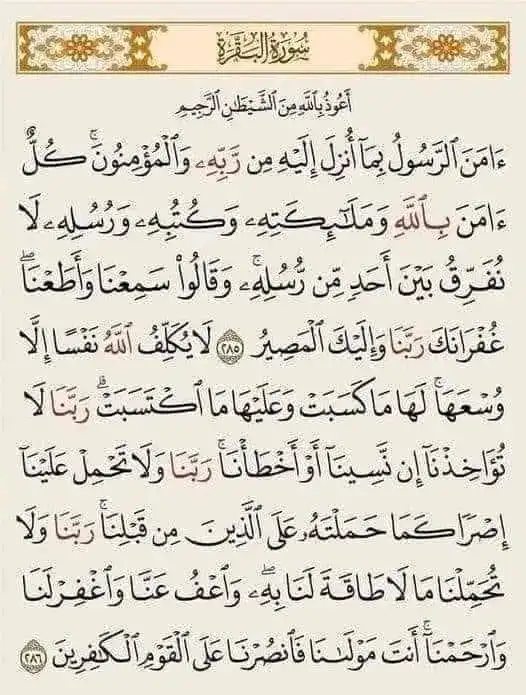
Transliteration
The transliteration and Pronounciation of these verses are:
- Aamanar-Rasoolu bimaaa unzila ilaihi mir-Rabbihee walmu’minoon; kullun aamana billaahi wa Malaaa’ikathihee wa Kutubhihee wa Rusulihee laa nufarriqu baina ahadim-mir-Rusulih wa qaaloo sami’naa wa ata’naa ghufraanaka Rabbanaa wa ilaikal-maseer.
- Laa yukalliful-laahu nafsan illaa wus’ahaa; lahaa maa kasabat wa ‘alaihaa maktasabat; Rabbanaa laa tu’aakhiznaaa in naseenaaa aw akhtaanaa; Rabbanaa wa laa tahmil-‘alainaaa isran kamaa hamaltahoo ‘alal-lazeena min qablinaa; Rabbanaa wa laa tuhammilnaa maa laa taaqata lanaa bih; wa’fu ‘annaa waghfir lanaa warhamnaa; Anta mawlaanaa fansurnaa ‘alal qawmil kaafireen.
Amana Rasulu Surah
The surah which amana rasul is mentioned is Surah Al Baqarah, verse 285-286. It is also called the last two verses of Surah al-Baqarah.
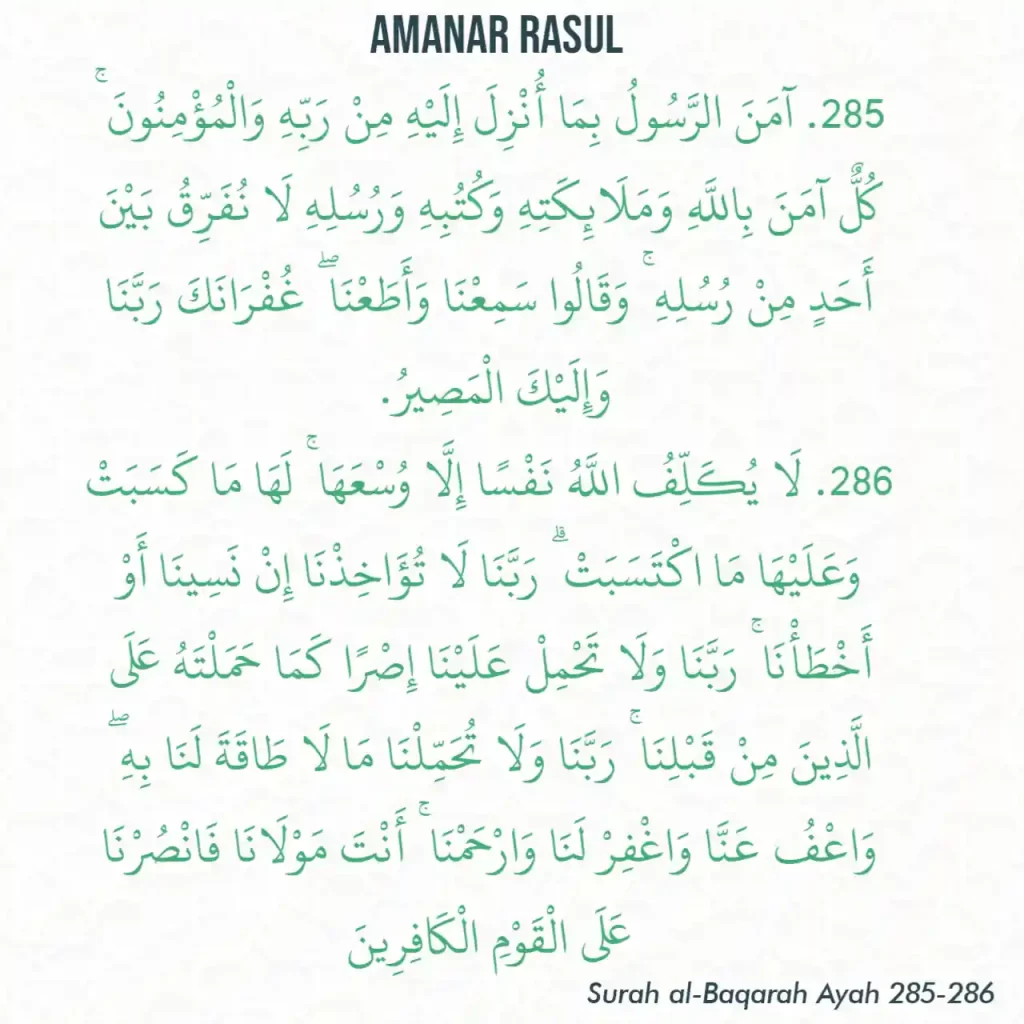
Amanar Rasul Benefits
The benefits of Amana Rasul, the last two verses of Soorat al-Baqarah is mentioned is some authentic Hadiths. The Hadiths on the Virtue of These Two Ayat, May Allah Benefit Us by Them are:
It was narrated from Abu Mas’ood al-Ansaari (may Allaah be pleased with him) that the Prophet (peace and blessings of Allaah be upon him) said: “Whoever recites the last two verses of Soorat al-Baqarah at night, they will suffice him.” Narrated by al-Bukhaari (5009) and Muslim (2714).
Advertisements
Ibn al-Qayyim said in al-Waabil al-Sayyib (132): They will suffice him against any evil that may harm him.
It was narrated that ‘Ali (may Allaah be pleased with him) said:
“I did not think that any sane person could sleep without reciting the last three verses of Soorat al-Baqarah.”
Advertisements
In al-Adhkaar (220), al-Nawawi attributed it to the report of Abu Bakr ibn Abi Dawood, then he said: It is saheeh according to the conditions of al-Bukhaari and Muslim.
Muslim recorded that Abdullah said, “When the Messenger of Allah went on the Isra journey, he ascended to the Sidrat Al-Muntaha in the sixth heaven, where whatever ascends from the earth ends at, and whatever descends from above it ends at.
When that covered the lote tree which did cover it! (53:16) meaning, a mat made of gold.
The Messenger of Allah was then given three things: the five prayers, the last Ayat in Surah Al-Baqarah and forgiveness for whoever did not associate anything or anyone with Allah from his Ummah.
In case you need the Tafsir, deep meaning, and commentary of these verses, we have brought you the meaning of Amana Rasulu from Tafseer Ibn Katheer.
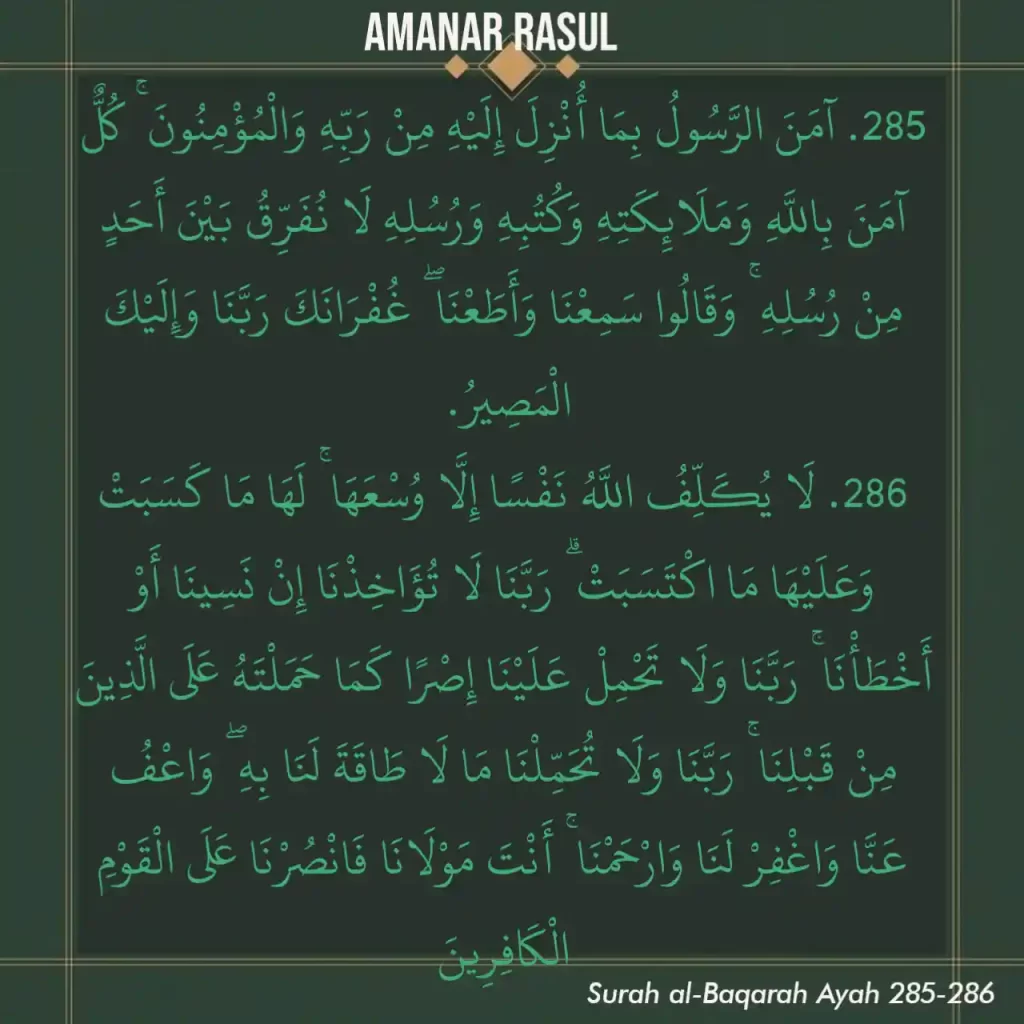
The Tafsir of the Last Two Ayat of Surah Al-Baqarah
Allah said, The Messenger believes in what has been sent down to him from his Lord, and (so do) the believers.
Allah said, Each one believes in Allah, His Angels, His Books, and His Messengers. (They say,) “We make no distinction between one another of His Messengers.”
Therefore, each of the believers believes that Allah is the One and Only and the Sustainer, there is no deity worthy of worship except Him and there is no Lord except Him.
The believers also believe in all Allah’s Prophets and Messengers, in the Books that were revealed from heaven to the Messengers and Prophets, who are indeed the servants of Allah.
Further, the believers do not differentiate between any of the Prophets, such as, believing in some of them and rejecting others.
Rather, all of Allah’s Prophets and Messengers are, to the believers, truthful, righteous, and they were each guided to the path of righteousness, even when some of them bring what abrogates the Law of some others by Allah’s leave.
Later on, the Law of Muhammad, the Final Prophet and Messenger from Allah, abrogated all the laws of the Prophets before him.
So the Last Hour will commence while Muhammad’s Law remains the only valid Law, and all the while a group of his Ummah will always be on the path of truth, apparent and dominant.
Allah’s statement, And they say, “We hear, and we obey,” means, we heard Your statement, O our Lord, comprehended and implemented it, and adhered to its implications.
“(We seek) Your forgiveness, our Lord, contains a plea and supplication for Allah’s forgiveness, mercy and kindness.
And to You is the return (of all).”
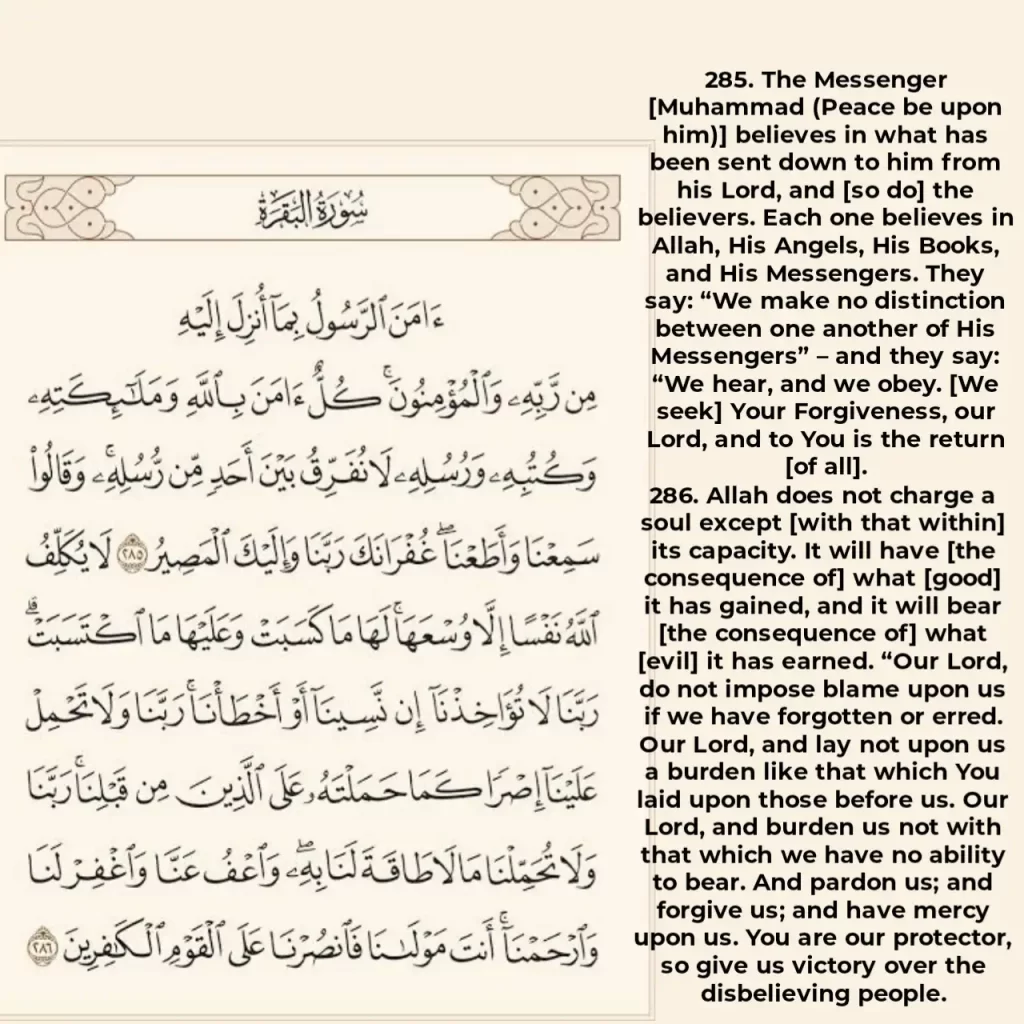
Allah’s statement: Allah burdens not a person beyond his scope, means, Allah does not ask a soul what is beyond its ability.
This only demonstrates Allah’s kindness, compassion and generosity towards His creation.
This Ayah is the Ayah that abrogated the Ayah that worried the Companions, that is, Allah’s statement,
(And whether you disclose what is in yourselves or conceal it, Allah will call you to account for it), (2:284).
This indicates that although Allah will question His servants and judge them, He will only punish for what one is able to protect himself from.
As for what one cannot protect himself from, such as what one says to himself – or passing thoughts – they will not be punished for that.
We should state here that to dislike the evil thoughts that cross one’s mind is a part of faith.
Allah said next, He gets reward for that which he has earned, of good.
And he is punished for that which he has earned, of evil, that is, concerning the acts that one is responsible for.
Allah then said, (mentioning what the believers said) while directing His servants to supplicate to Him, all the while promising them that He will answer their supplication:
“Our Lord! Push us not if we forget or fall into error,” meaning, “If we forgot an obligation or fell into a prohibition, or made an error while ignorant of its ruling.”
We mentioned the Hadith by Abu Hurayrah, that Muslim collected, wherein Allah said, “I shall (accept your supplication).”
There is also the Hadith by Ibn Abbas that Allah said, “I did (accept your supplication).”
Our Lord! Lay not on us a burden like that which You did lay on those before us (Jews and Christians),
Means, “Even if we were able to perform them, do not require us to perform the difficult deeds as You required the previous nations before us, such as the burdens that were placed on them.
You sent Your Prophet Muhammad, the Prophet of mercy, to abrogate these burdens through the Law that You revealed to him, the Hanifi (Islamic Monotheism), easy religion.”
Muslim recorded that Abu Hurayrah said that; the Messenger of Allah said that Allah said, “I shall (accept your supplication).”
Ibn Abbas narrated that the Messenger of Allah said that Allah said, “I did (accept your supplication).”
There is the Hadith recorded through various chains of narration that; the Messenger of Allah said, I was sent with the easy Hanifiyyah way.
Our Lord! Put not on us a burden greater than we have strength to bear, of obligations, hardships and afflictions, do not make us bear what we cannot bear of this.
(Our Lord! Put not on us a burden greater than we have strength to bear), We mentioned that Allah said,
“I shall (accept your supplication)” in one narration, and, “I did (accept your supplication),” in another narration.
Pardon us, meaning, between us and You regarding what You know of our shortcomings and errors.
And grant us forgiveness, concerning what is between us and Your servants. So do not expose our errors and evil deeds to them.
Have mercy on us, in what will come thereafter. Therefore, do not allow us to fall into another error.
They say that those who commit error need three things: Allah’s forgiveness for what is between Him and them, that He conceals these errors from His other servants, and thus does not expose them before the servants, and that He grants them immunity from further error.”
We mentioned before that Allah answered these pleas, “I shall,” in one narration and, “I did,” in another narration.
You are our Mawla, meaning, You are our supporter and helper, our trust is in You, You are sought for each and every type of help and our total reliance is on You.
There is no power or strength except from You. And give us victory over the disbelieving people.
Those who rejected Your religion, denied Your Oneness, refused the Message of Your Prophet, worshipped other than You and associated others in Your worship.
Give us victory and make us prevail above them in this and the Hereafter.
Allah said, “I shall,” in one narration, and, “I did,” in the Hadith that Muslim collected from Ibn Abbas.
Further, Ibn Jarir recorded that Abu Ishaq said that; whenever Mu`adh would finish reciting this Surah, (And give us victory over the disbelieving people), he would say “Amin.”
Advertisements

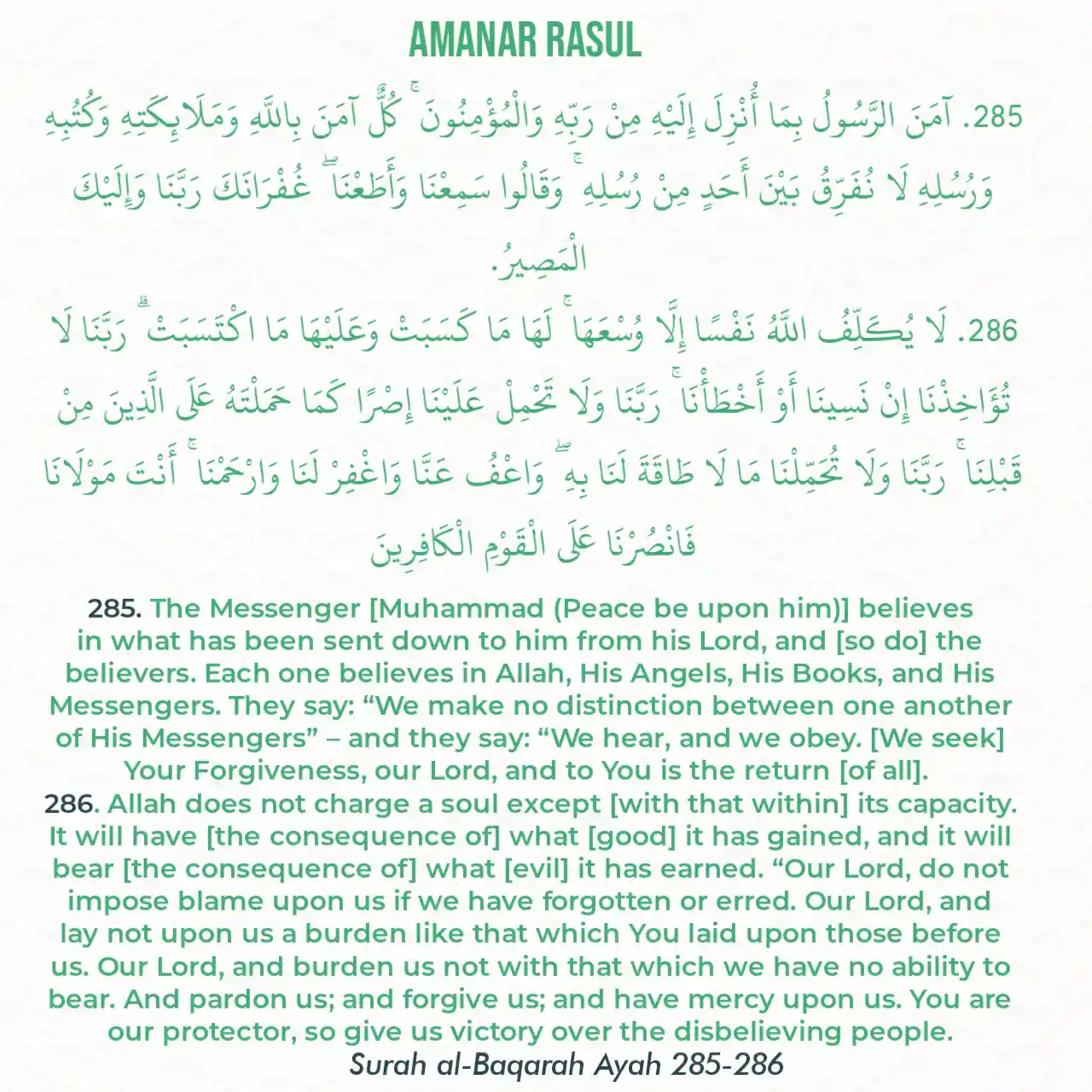


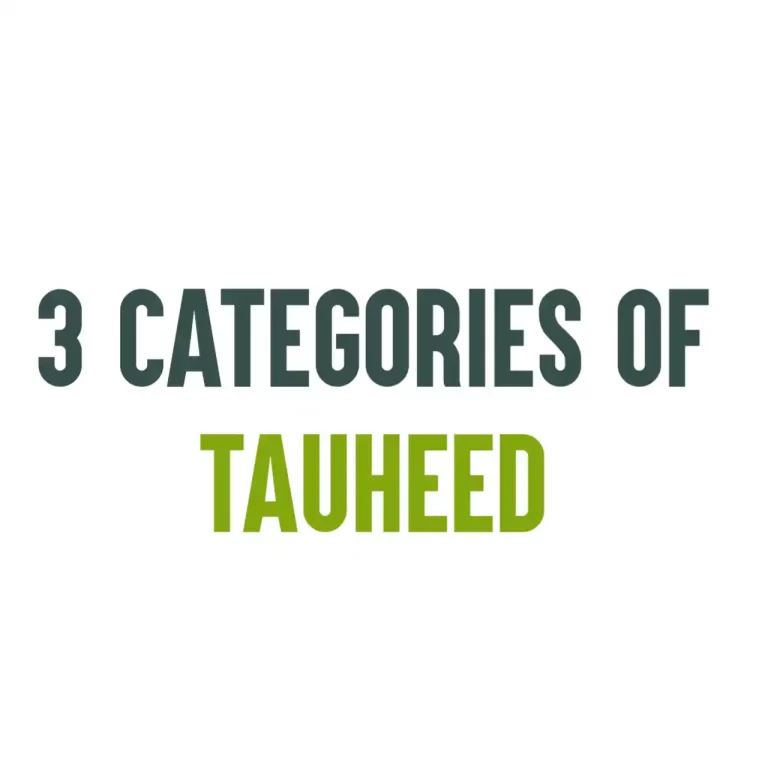



One Comment